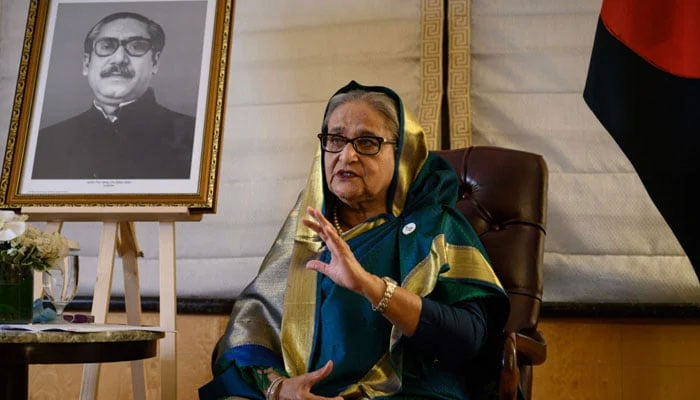Sheikh Hasina faces second arrest warrant
Dhaka and New Delhi have bilateral extradition treaty which would permit her to return to Bangladesh to face criminal trial
ISLAMABAD: A Bangladeshi court has issued a second arrest warrant against exiled former Bangladeshi prime minister Sheikh Hasina, this time accusing her of involvement in enforced disappearances and extrajudicial killings during her tenure.
The warrant was announced by Tajul Islam, chief prosecutor of Bangladesh’s domestic International Crimes Tribunal (ICT). Justice Golam Mortuza Mozumder issued the order in response to an application from the prosecution, but legal experts claim that for the trial to start Sheikh Hasina must be present before the court to participate in the trial either physically or virtually.
Dhaka has revoked Sheikh Hasina’s diplomatic passport. While Bangladesh and India have a bilateral extradition treaty which would permit her to return to Bangladesh to face a criminal trial, a clause in the treaty says that extradition might be refused if the offence is of a ‘political character’.
However, so far, New Delhi -- like the time the first arrest warrant was announced -- has not commented on Monday’s issuance of a second warrant which has also asked India for Sheikh Hasina’s extradition.
According to chief prosecutor Tajul Islam, “The court issued a warrant against Sheikh Hasina and 11 others, including her military adviser, military personnel, and other law enforcement officials....We want to ensure that the trial concludes as soon as possible but that doesn’t mean we will break the law or impose a verdict without due process”.
The tribunal has set a deadline of February 12, 2025, for the arrest, and Bangladesh authorities have already requested assistance from Interpol and formally approached India through diplomatic channels to facilitate her extradition.
Among the accused are former defence advisor to Hasina Major General (r) Tariq Ahmed Siddique, former Inspector General of Police (IGP) Benazir Ahmed, and former Director General of the National Telecommunication Monitoring Center (NTMC) Ziaul Ahsan. All are accused of being involved in extrajudicial killings and the unlawful disappearance of political opponents.
“A horrible culture (forced disappearance) had begun in the country during the Hasina regime. And giving justice to the victim families through a proper trial can be the right way to end this horrible practice”, added Tajul Islam while speaking to the media.
Meanwhile, Pakistan has remained guarded in its response to the second arrest warrant of the former Bangladeshi leader who remains confined in New Delhi. Spokesperson at the Foreign Office Shafqat Ali Khan, while speaking to The News, said: “We have enormous respect for the people of Bangladesh and their ability to resolve their domestic affairs, and we will continue to support the people of Bangladesh”. However, he refrained from commenting directly on Monday’s announcement.
Per the spokesperson, “Pakistan, therefore, has no comments to offer with respect to any domestic developments taking place in Bangladesh and its engagements with other countries”. The first warrant against Hasina was issued in October 2024, and was related to alleged crimes against humanity during the student protests against her government. The ICT ordered that Hasina and 45 other individuals be arrested and presented before the court by November 18, 2024.
According to legal experts, in common law jurisdictions, “a trial cannot commence in absentia of an accused, although there is an obligation on the state under customary international law under the aut dedere aut judicare principle to ‘either extradite or prosecute’ any accused facing a grave international crime such as genocide, war crimes, crimes against humanity”.
-
 Kanye West's Best Songs: Fans Argue Over Bold Top 10 Ranking On Social Media
Kanye West's Best Songs: Fans Argue Over Bold Top 10 Ranking On Social Media -
 King Charles Secretly Relies On Advice From THIS Royal
King Charles Secretly Relies On Advice From THIS Royal -
 Jennifer Garner Reveals Beauty Choice She Makes As Botox Alternative In Her 50s
Jennifer Garner Reveals Beauty Choice She Makes As Botox Alternative In Her 50s -
 Kate Middleton Drops Four-word Message For Young Girl After Wales Visit
Kate Middleton Drops Four-word Message For Young Girl After Wales Visit -
 Shamed Andrew Uncensored ‘massages’ Should Be Refunded To Public
Shamed Andrew Uncensored ‘massages’ Should Be Refunded To Public -
 Kylie Kelce Reveals Rules She Wants Daughter Bennett To Learn At 3: No More 'passies'
Kylie Kelce Reveals Rules She Wants Daughter Bennett To Learn At 3: No More 'passies' -
 Smartphone Market Set For Biggest-ever Decline In 2026
Smartphone Market Set For Biggest-ever Decline In 2026 -
 Mud, Rain, Loincloths: All About Japan’s 200-year-old Harvest Wrestling Ritual
Mud, Rain, Loincloths: All About Japan’s 200-year-old Harvest Wrestling Ritual -
 Jonathan Majors Set To Make Explosive Comeback To Acting After 2023 Conviction
Jonathan Majors Set To Make Explosive Comeback To Acting After 2023 Conviction -
 Next James Bond: Why Jacob Elordi May Never Get 007 Role?
Next James Bond: Why Jacob Elordi May Never Get 007 Role? -
 Maddox Drops Pitt From Surname In Credits Of Angelina Jolie’s New Film 'Couture' Despite Truce From Father's End In Legal Battle
Maddox Drops Pitt From Surname In Credits Of Angelina Jolie’s New Film 'Couture' Despite Truce From Father's End In Legal Battle -
 Meghan Markle Adds Diamonds To Engagement Ring For Jordan Trip
Meghan Markle Adds Diamonds To Engagement Ring For Jordan Trip -
 Burger King Launches AI Chatbot To Track Employee Politeness
Burger King Launches AI Chatbot To Track Employee Politeness -
 Andrew’s Woes Amid King Charles’ Cancer Battle Triggers Harry Into Action For ‘stiff Upper Lip’ Type Dad
Andrew’s Woes Amid King Charles’ Cancer Battle Triggers Harry Into Action For ‘stiff Upper Lip’ Type Dad -
 Experts Warn Andrew’s Legal Troubles In UK Could Be Far From Over
Experts Warn Andrew’s Legal Troubles In UK Could Be Far From Over -
 Teyana Taylor Reflects On Dreams Turning Into Reality Amid Major Score
Teyana Taylor Reflects On Dreams Turning Into Reality Amid Major Score




